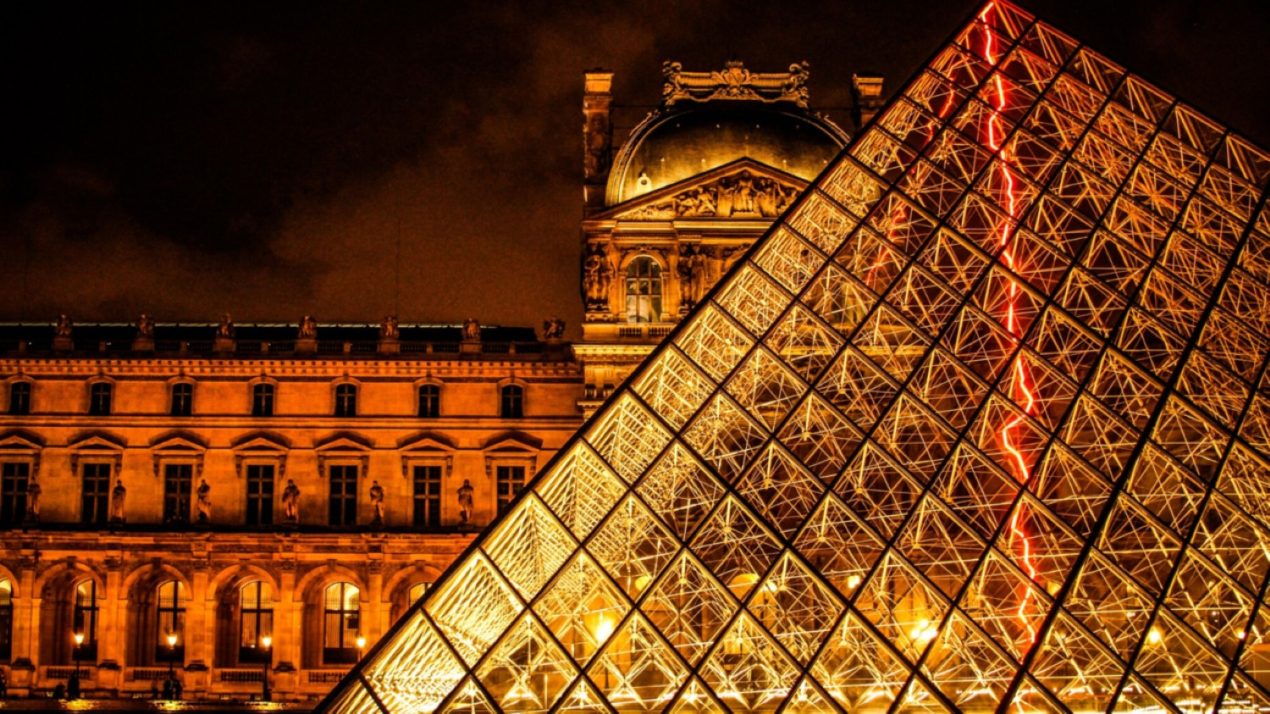Visiting France: My Best Tips for Enjoying an Artsy Trip
This page may contain affiliate links to products or services I’m happy to recommend. If you click on an affiliate link and then make a purchase, Artsy Traveler may earn a small commission at no cost to you. Thank you!
So you’re planning on visiting France? Excellent idea! France is my favorite country to visit in Europe. Well, okay, I love all of the countries I’ve traveled to, but France has a special place in my heart.
Even after probably well over a dozen trips to France over the years, I’ve not run out of things to see and do.
If you’re planning to visit France, the question you need to ask yourself is how much time do you have and where should you start?
If you are an arts lover, then put France right at the top of your must-see-countries-in-Europe list. France has so much to offer the artsy traveler. You’ll find world-class art museums, incredible prehistory sites, amazing cathedrals, and swoon-worthy landscapes.

The light and the landscapes have attracted visual artists for centuries. My husband, Gregg Simpson, is one of them! So many of his paintings and drawings have been inspired by–and in many cases created in–France. Several of the stories in our collaboration Pastel & Pen: Travels in Europe are paired with pieces that Gregg created while we were traveling in France.
Here are my posts about visiting France to give you ideas about what to see.
Posts About France

Eiffel Tower: Should You Soar to the Summit?

Why Visit Lascaux IV in the Stunning Dordogne
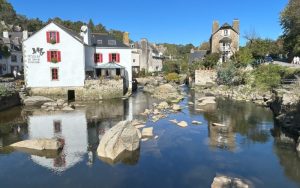
Savoring Life in Pont-Aven—The City of Artists

Six Sensational Days in Paris for an Artsy Traveler

Discover the Best of the Musée d’Orsay in Paris

Where To Go in France: Best 10-day Itinerary
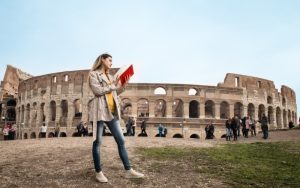
Top Ten Artsy Novels to Read in Europe
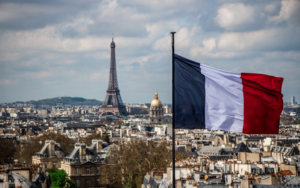
Six Favorite Regions in France

Novels Set in France Perfect for the Artsy Traveler
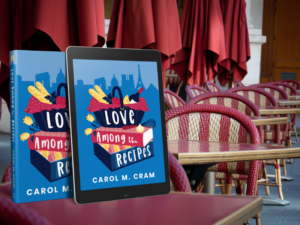
Love Among the Recipes: Paris Sights & Bistro Dishes
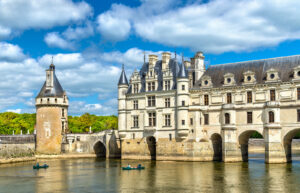
17 Must-See Places to Visit in France You Should Know About

Seven Super Single-Artist Museums in Europe You Should Visit
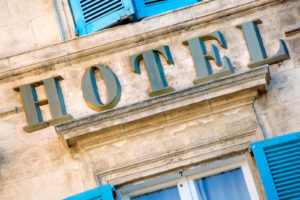
Recommended Places to Stay in France That Will Make You Want to Return
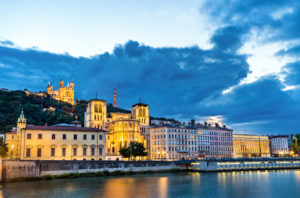
Discover Lyon–Friendly, Vibrant & Very French

Paris for Art Lovers: Nine of the Best Small Museums in Paris
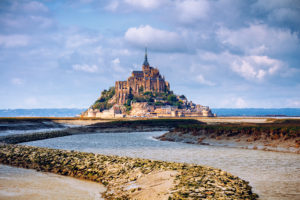
Top Normandy Sights to Excite Art & History Lovers

Take a Cooking Class in Paris
Map of France: My Top Nine Must-Visits
The map below shows nine of my favorite regions/cities to visit in France. Click a number to read more about the location and to link to relevant posts.
Practical Tips for Visiting France
France is an easy country to travel around thanks to an efficient and fast train system, a network of toll freeways, thousands of restaurants (most of which are good and some that are out of this world), and accommodation options at all budget levels (except ‘really cheap’, because hey, you’re in western Europe).
In this post, I cover some of the basics of visiting France–checking events & exhibitions, choosing transportation and accommodations, and tips for traveling.
To make the most of your visit to France, pick one or two regions and stay for a week (or more) in each. Check my post on my six favorite regions to explore in France.
Check Events and Exhibitions
While creating your itinerary, search the web for exhibitions and performances that will be on while you’re in a town or region. A bit of advance planning ensures that you’re in the right place at the right time. There are few things worse for the artsy traveler than to arrive in a city the day after an exhibition of a favorite artist closes. Ouch!
Once you’ve arrived in France and you’ve embarked upon your travels, keep an eye out for events advertised on posters, ask your server at dinner to tell you what’s happening in the area, and chat with other travelers about their experiences.
In addition to the artsy sights you’ve planned to visit in France, you may discover several more you might never have heard of that will enrich your visit.
When we visit France, we’re always on the lookout for local events like festivals, exhibitions, and concerts frequented mostly by locals. Most of the time, we find information on posters or by talking to people.
Choose Your Transportation
When visiting France, should you drive or should you take trains, busses, and taxis? Your answer choice depends on where you home-base in France and how you like to travel.
We’ve traveled around Europe by train and by car and we prefer driving because first, Gregg is almost always carrying a box or two of his paintings to an exhibition and second, we like the freedom.
But cars and gas are not cheap (although neither are trains) and driving can be hairy, even with GPS and sometimes because of GPS.
I suggest a combo approach to getting from A to B in France.
TIP: Start or end in a major hub such as Paris or Nice (our two faves). You don’t need a car in Paris. Gregg and I have driven into the center of Paris and I don’t advise it. Please trust me on this. Drivers in the French capital are a tad on the crazy side. Also, Paris has recently declared that at least some Sundays are traffic-free, which means no driving in Paris. Taxis are still allowed.
Taking the Train
If you’re heading out from Paris to explore France, take the TGV—France’s marvelous high-speed train service—to another hub such as Avignon, Lyon, or Bordeaux. You’ll recline in comfort, watch the green fields whiz past at an indecent rate and arrive refreshed at your destination.
From there, pick up your car and head out on roads that are considerably less congested than those surrounding Paris.
If you start your visit to France in Nice, consider picking your car up after you’ve spent a few days exploring the area on local trains. The traffic in the region can be horrendous!
On one trip to the area, we parked our car for three days in Monte Carlo and took the train to visit friends in Menton. The day was so much more relaxing than it would have been had we driven.
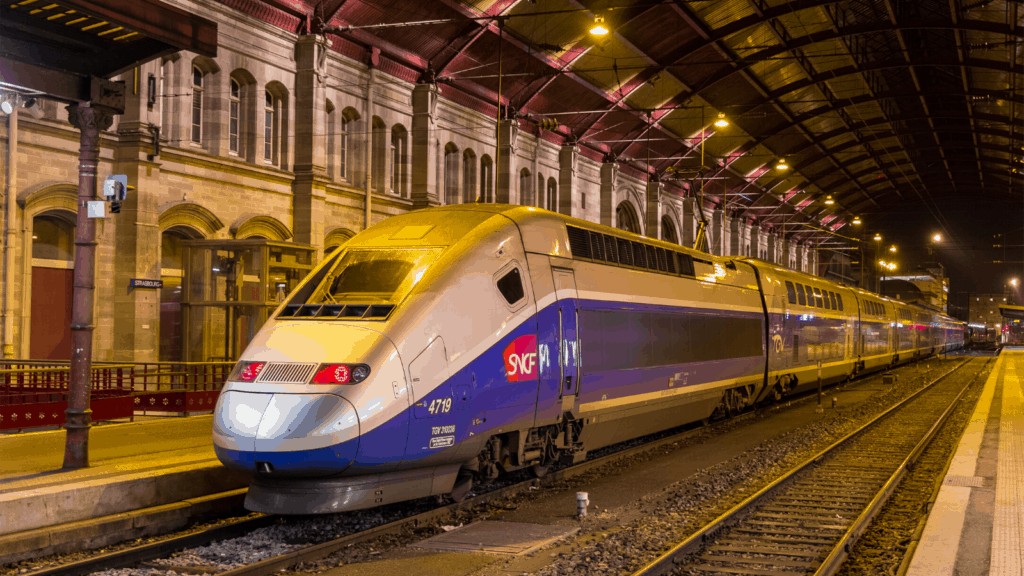
Renting a Car
In Paris, pick up (or drop off) your car at Charles de Gaulle airport. Yes, it’s quite a distance from the city, but the convenience is worth the extra cost of a taxi into Paris. Or opt to take the train into the city.
TIP: Gregg and I like taking the train from Paris to the modern TGV station outside Avignon. Minutes after stepping into the warm Provençal air, we’ve collected our rental car from the large parking lot in front of the station and are on the road heading for the Luberon and bliss.
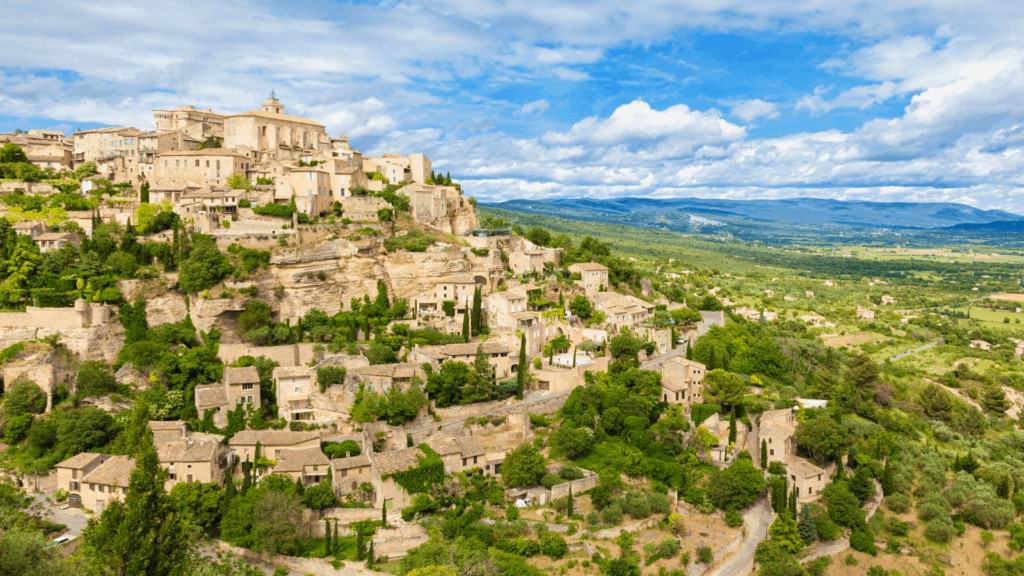
Driving Tips in France
Driving in France comes in two flavors—fast on the autoroutes and slow on the side roads. I recommend a combination of both.
To get from city to city, take the autoroute. The tolls do add up, but you’ll get to where you’re going quickly and relatively stress-free. We’ve logged thousands of kilometers on the autoroutes of France. Most of the time, it’s smooth sailing, although every so often we’ve been trapped for hours in some spectacular traffic jams. But that can happen at home so just go with it.
TIP: The café fare in the autoroute rest stops (aires) is generally pretty good although monotonous. Buy groceries and use the aires as picnic stops. They all have picnic tables and are generally set in bucolic areas.
Driving on the side roads in France can be delightful or scary. We’ve driven on some ridiculously narrow roads with knife-sharp switchbacks, no guardrails and precipitous drops. If the road looks like a piece of twisted spaghetti on the GPS, consider an alternate route.
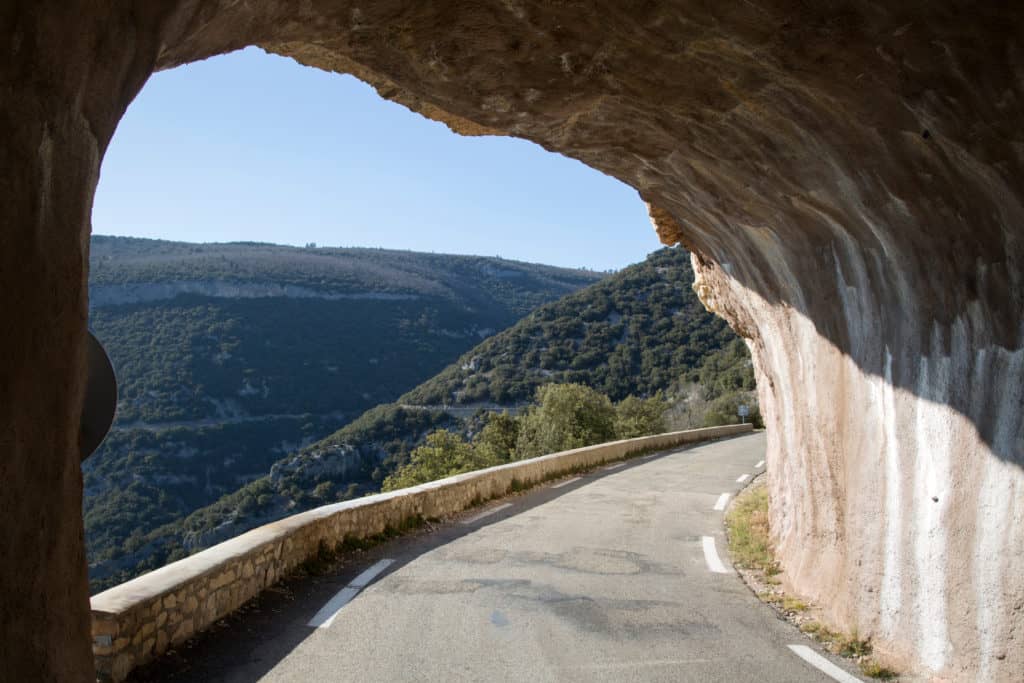
When you arrive at a town, avoid driving directly into the centre-ville. The streets are very narrow (we’ve scraped our share of side mirrors) and parking may be non-existent.
TIP: Stow the car in a parking garage on the edge of town and then walk or grab a taxi. That way, you’ll avoid the frayed nerves that can result from trying to navigate streets originally built for ox carts and feet.
Choose Where to Stay While Visiting France
After years of traveling and sightseeing, we increasingly prefer settling into a house or apartment and living like we do at home—except with warmer weather and more interesting food.
We spend our mornings doing our thing (writing for me; painting for Gregg). Then, around noon, we drive to the local village to pick up supplies and stop en route for a picnic, then spend the afternoons relaxing and/or working before setting off around 4 PM for a spot of sightseeing followed by a nice dinner.
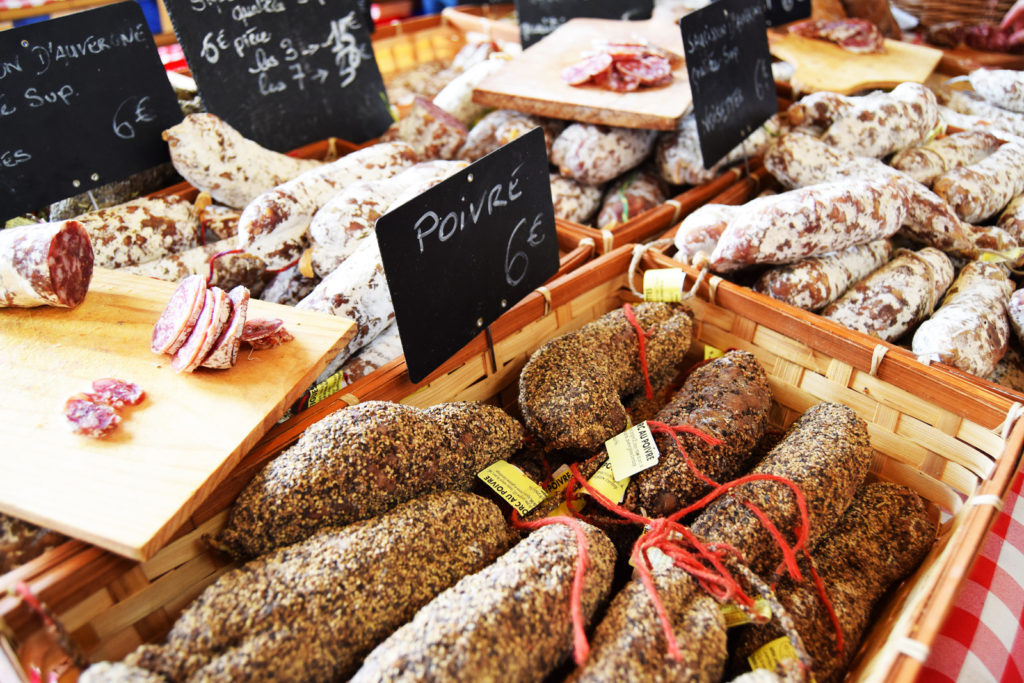
We also enjoy staying in hotels. When touring in the countryside, I book small and attractively appointed “mom and pop”-owned establishments. I like places that have beautiful settings and free parking.
When visiting towns or cities by car, we often choose one of the higher-end chain hotels such as a Novotel or Mercure. The quality of the accommodation is consistent and the locations convenient for drivers.
When booking accommodation, I always pay attention to location, having learned from experience the folly of driving into the center of a medieval town or village in search of a hotel.
Accommodation Budget
France is not the most expensive country in Europe (the Scandinavian countries have that honor), nor is it as relatively inexpensive as many eastern European countries.
When traveling by car and staying in hotels, we budget about €200-250 a day for accommodation, gas, and meals, which include picnics and restaurants. Comfortable hotels (three- and four-star) are around €100-150 per night, more in the cities.
In Paris, be prepared to spend €200-250 per night for accommodation. You may find lower-priced hotels, but we’ve learned over the years that the difference between a budget two-star hotel and a lovely, air-conditioned four-star hotel can be as little as €30. Go for the nicer places and enjoy yourself!
When we stay in an apartment or house for a week or more, our daily living costs go down. We tend to eat in much more often and we don’t drive as much as we do on road trips. That said, a comfortable place on HomeAway can be about the same price as a hotel (although bigger).
I recorded the video below in June, 2019 while we were staying for two weeks near the village of Seillans to attend one of Gregg’s painting exhibitions.
Seillans in the Var area of Provence in 2019.
Use services such as booking.com and Trivago to book your accommodations in Europe. All your reservations are kept together in one place when you download the service’s app.
Booking.comEnjoy Eating in France (It’s Hard Not To)
Food and France—the two go hand in hand like, well, gourmet and tasty. While visiting France, I’ve eaten some of the best meals of my life—and the worst. Oh yes, I will not forget in a hurry the massive dish of putrid-tasting beef kidneys I was served in the small town of Lussac-les-Châteaux in the Poitiers region.
TIP: Consult your pocket French-English food dictionary (or check your phone) before ordering a dish that you don’t recognize. I blithely ordered rognons de boeuf only to discover that rognons are kidneys and I don’t do organ meats. Ever.
I digress.
French Cuisine
Eating in French restaurants and enjoying French cuisine should be a major component of your trip. Budget for several splurge dinners, as in €30-40 per person. You could certainly spend more—a lot more. But for Gregg and me, €100 total including wine is as high as we go—and we still speak fondly of some of those top meals in France.
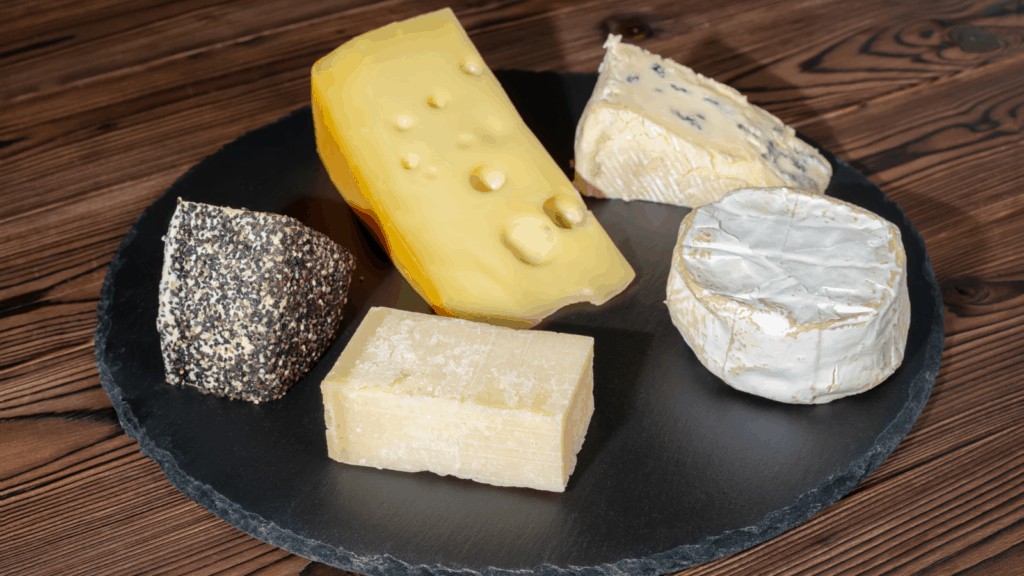
The difference between okay eating and spectacular eating in France averages about €20 per person— more in the big cities like Paris and somewhat less in small towns.
You can definitely eat well on a budget in Europe. Combine splurge dinners with regular dinners and then every so often enjoy a picnic and cook your own meals if you’re staying in a house or apartment.
As for what to eat in France, the fare is generally meat-based with vegetables, a starch (best potatoes in the world) and a sauce. Most menus include poulet (chicken), canard (duck), poisson (fish) and variations on boeuf and porc.
The posher the place, the shorter the menu.
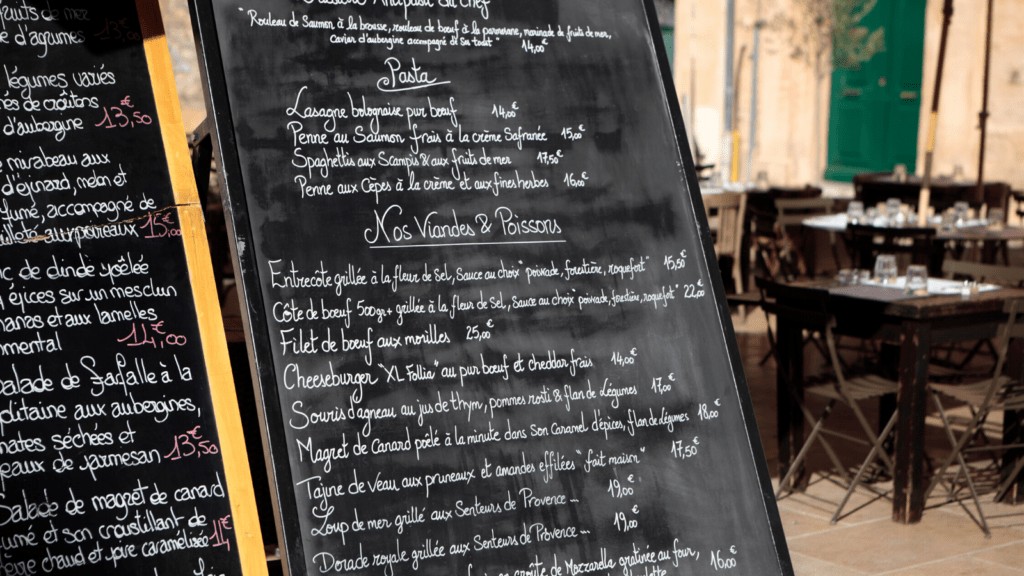
Restaurants in France
Chain restaurants abound, with long and glossy menus often based around steak, but search out the small restaurants where the menu du jour (menu of the day) is scrawled on a chalkboard. Also, make reservations for the nicer restaurants. Usually, unless the restaurant is Michelin-starred, you’ll be fine if you call around lunchtime for a same-day dinner reservation.
Another good choice on most menus, at least at déjeuner (lunch), are the grandes salades. I’m partial to the fruits de mer (seafood) and lardons (bacon) frisée salads often served with chunks of warm goat cheese. Oh yeah!
And while you’re in France, you’ll of course want to sample the local wines. I typically order the house wines—they’re usually delicious and the prices are reasonable.
Tours to Take While Visiting France
I’m a big fan of taking local tours while traveling in France, particularly specialty tours. On my next trip to France, I’m planning to take a full-day tour from Paris to the World War I battlefields around the Somme. That sounds a bit grim, but I’m thinking of setting a novel during World War I so, you know, research.
Find local tours in the town you’re visiting (walking tours are awesome!) or pre-book tours of a specific region. Here are some options.
Conclusion
Have you traveled in France? Share your recommendations with other Artsy Travelers in the Comments below.
Here are posts to read to help you plan and enjoy your time in France:
- Eiffel Tower: Should You Soar to the Summit?
- Why Visit Lascaux IV in the Stunning Dordogne
- Savoring Life in Pont-Aven—The City of Artists
- Six Sensational Days in Paris for an Artsy Traveler
- Discover the Best of the Musée d’Orsay in Paris
- Where To Go in France: Best 10-day Itinerary
- Six Favorite Regions in France
- 17 Must-See Places to Visit in France You Should Know About
- Seven Super Single-Artist Museums in France You Should Visit
- Compelling Novels Set in France Perfect for the Artsy Traveler
- Recommended Places to Stay in France That Will Make You Want to Return
- Discover Lyon–Friendly, Vibrant & Very French
- Top Normandy Sights to Excite Art & History Lovers
- Take a Cooking Class in Paris
